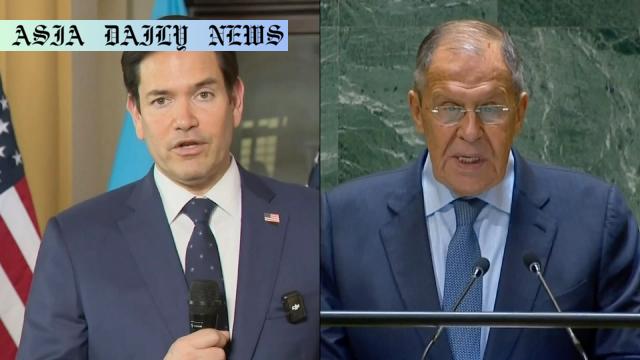US-Russia Summit: Lavrov and Rubio pledge regular contact to prepare for a significant diplomatic endeavor.
- Key Point 1: Lavrov and Rubio reaffirmed commitments to preparing for a major US-Russia summit.
- Key Point 2: Both diplomats focused on improving dialogue and addressing global issues like Ukraine and Palestine.
- Key Point 3: The call followed talks between Presidents Putin and Trump earlier in the week.
- Key Point 4: The initiative for this conversation reportedly came from the United States.

Introduction: A Renewed Focus on Diplomacy
The dynamics between the United States and Russia have always played a pivotal role in shaping international diplomacy and security policies. In a recent effort to restore open dialogue and address global challenges, Russian Foreign Minister Sergey Lavrov and US Secretary of State Marco Rubio have committed to regular communications. This comes as a build-up to a potential US-Russia summit that aims to foster cooperative relations and address ongoing geopolitical concerns.
Background: Context of the Conversation
The call between Lavrov and Rubio on Saturday followed an earlier discussion between Russian President Vladimir Putin and US President Donald Trump earlier in the week. The initiative for this diplomatic step reportedly came from the United States, marking a positive effort to prioritize structured talks. Historically, relations between the two nations have been strained, with contentious issues such as the Russia-Ukraine conflict and disagreements on Middle Eastern policies. This call signifies a renewed effort to overcome these challenges through dialogue.
Key Objectives of the Summit
During their conversation, Lavrov and Rubio reiterated their commitment to aligning their efforts with the vision set by their respective presidents. The primary objective of these talks is to pave the way for a summit that will address pressing international issues. Key topics include the resolution of the Russia-Ukraine conflict and mitigating tensions related to Palestine. Lavrov emphasized Russia’s willingness to collaborate in restoring constructive dialogue, further emphasizing the importance placed on diplomacy by both nations.
Building on Recent Presidential Discussions
The dialogue between Lavrov and Rubio builds directly on the phone conversation held between Presidents Trump and Putin. During that exchange, both leaders highlighted the necessity of diplomatic dialogue to address existing geopolitical challenges. This follow-up mission by top diplomats underscores the seriousness of the summit preparation, as both nations seek to ensure a cooperative framework for resolving disputes.
Strategic Importance of the Talks
Collaboration between the United States and Russia remains critical in navigating complex global issues. From controlling nuclear proliferation to tackling climate challenges and regional instability, the joint role these superpowers play cannot be overstated. By agreeing to regularly conduct talks, Lavrov and Rubio set a precedent for consistent communication and problem-solving, which has been largely absent in recent years.
Looking Forward: Bridging Divides
The overarching sentiment from the US State Department emphasized Trump’s vision for resolving the Ukraine conflict. Similarly, Russia’s Ministry of Foreign Affairs noted the importance of cooperative approaches in tackling regional matters. Moving forward, the success of their mutual efforts largely depends on their ability to address contentious matters without resorting to aggressive rhetoric. In turn, this summit preparation serves as a litmus test for diplomatic goodwill between the nations.
Conclusion
The commitment for the US and Russia to engage in regular communication signals hope for improved bilateral relations and enhanced global cooperation. As Lavrov and Rubio steadily work toward a comprehensive summit, the world watches closely, anticipating signs of positive change in international relations. With dedication and focus, their collaboration holds the potential to resolve key conflicts and set a new tone for diplomacy in an era of global uncertainty.



Commentary
Renewed Diplomatic Efforts
The announcement of regular dialogue between Russian Foreign Minister Sergey Lavrov and US Secretary of State Marco Rubio signifies a promising step in fostering improved relations between the two nations. In an era where geopolitical tensions have been escalating, the commitment to consistent communication underscores the necessity of diplomacy in addressing global disputes. Their efforts highlight the value of dialogue as a tool for bridging divides and securing international peace.
The Impact of Leadership Collaboration
It is particularly noteworthy that this dialogue comes in the wake of discussions between Presidents Vladimir Putin and Donald Trump. While their interactions have received mixed reactions on the global stage, the continuation of talks at the ministerial level indicates a unified intent to build on these conversations. By aligning their diplomatic agencies, both leaders demonstrate a shared understanding of the importance of coordinated action in resolving issues like the Russia-Ukraine conflict and regional instability in Palestine.
Why This Matters
The broader implications of this development extend far beyond the potential US-Russia summit. Regular dialogue between these two nations could set a precedent for thawing icy international relations and introducing stability to volatile regions. Given their influence on global affairs, the success of this initiative could encourage other nations to follow suit in prioritizing diplomacy over divisive rhetoric. This makes Lavrov and Rubio’s collaboration a critical first step in achieving broader international cooperation.
Final Thoughts
While the journey to a successful summit may still face challenges, the initial willingness to engage in constructive conversation is commendable. It signals an understanding of shared global responsibilities, reminding the world that even the most polarized relationships can evolve through goodwill and dialogue. As their preparations unfold, it will be essential for both sides to remain committed to these ideals, ensuring that this effort translates into meaningful outcomes for peace and cooperation.